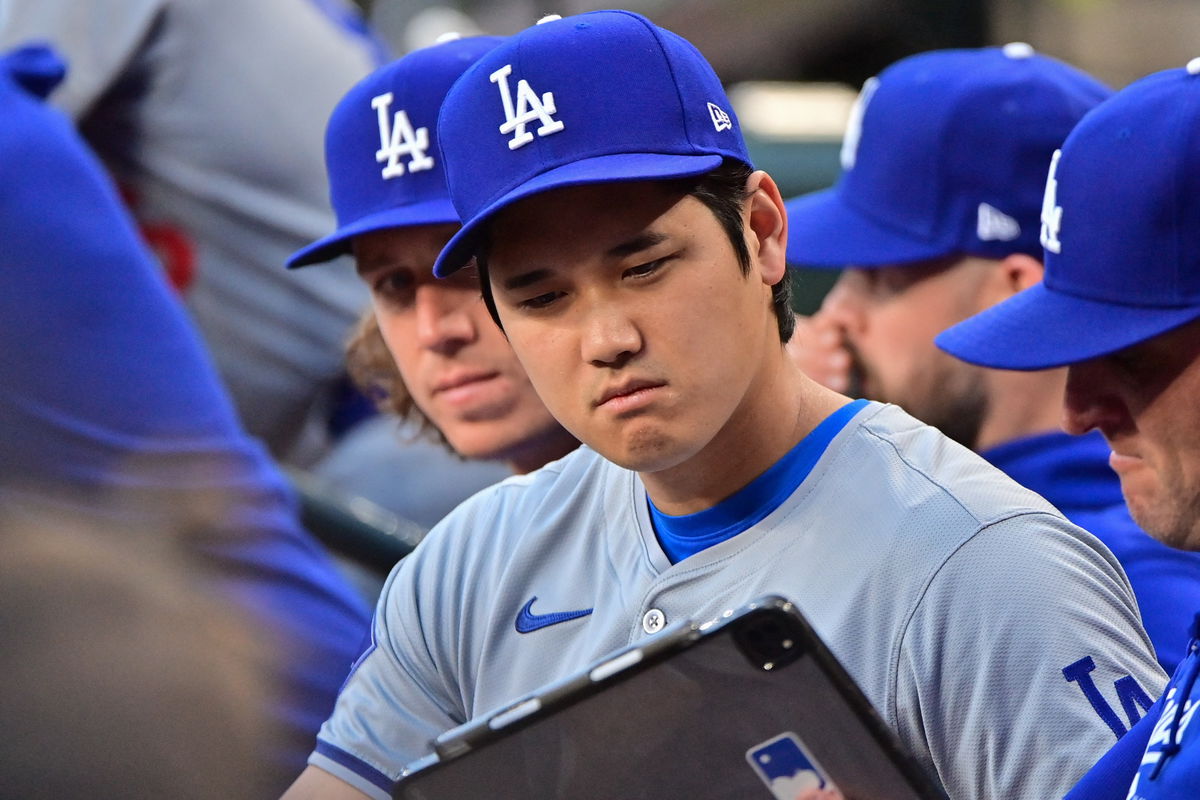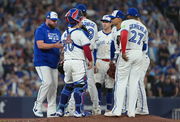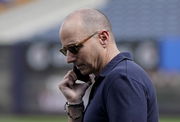
USA Today via Reuters
May 1, 2024; Phoenix, Arizona, USA; Los Angeles Dodgers two-way player Shohei Ohtani (17) studies a tablet in the first inning against the Arizona Diamondbacks at Chase Field. Mandatory Credit: Matt Kartozian-USA TODAY Sports

USA Today via Reuters
May 1, 2024; Phoenix, Arizona, USA; Los Angeles Dodgers two-way player Shohei Ohtani (17) studies a tablet in the first inning against the Arizona Diamondbacks at Chase Field. Mandatory Credit: Matt Kartozian-USA TODAY Sports
Stephen A. Smith, the perpetually amped-up titan of sports commentary, recently found himself on the unfamiliar side of controversy. Former MLB pitcher turned analyst Jonathan Papelbon didn’t mince words when he labeled Smith a “racist” following remarks about Japanese superstar Shohei Ohtani. And for once, the usually unyielding Smith didn’t just take the blow; he acknowledged the criticism.
Watch What’s Trending Now!
Let’s rewind. Smith, with his typical flair for the dramatic, argued that Ohtani shouldn’t be MLB’s first half-billion-dollar player, be it in the Los Angeles Dodgers’ clubhouse or outside. Why? According to Smith, empty stadium seats and a lackluster Los Angeles team. The trouble is, he missed the mark on Ohtani’s immense value. The Japanese phenom is a two-way unicorn, dominating as both pitcher and hitter—a feat rarely seen in modern baseball.
Smith’s comments didn’t just irk baseball purists; they hit a nerve with their potential racial undertones. Was there an underlying xenophobic slant to his questioning of Shohei Ohtani’s star power? Papelbon certainly thought so, and the backlash was swift.
ADVERTISEMENT
Jeff Passan very politely made Stephen A Smith look like a fool this morning on First Take over his Shohei Ohtani take. pic.twitter.com/0Zm6RkE8vT
— the Sports ON Tap (@thesportsontap) July 13, 2021
Smith’s no stranger to facing heat for his fiery opinions. But this was different. Big-name baseball reporters like Jeff Passan and Jun Lee took to Smith’s own show, First Take, to call him out. Now, let’s be real: this doesn’t happen without Smith’s say-so. He’s the executive producer, after all.
And here’s the kicker: Smith, in a rare moment of introspection, said, “I was criticized for it. I deserved to be criticized for it.” Hold on! Did the king of hot takes just admit he was wrong? It looks like it. This doesn’t mean Smith is suddenly sporting a halo. He’s still the same loud, opinionated powerhouse we know. But his concession here signals a nuanced shift. Maybe, just maybe, there’s more to Smith than bluster.
ADVERTISEMENT
From Hot Takes to Introspection: Analyzing Smith’s Shift on Shohei Ohtani comments
The Stephen A. Smith-Papelbon clash is more than a he-said-she-said feud. It highlights an underlying tension in sports commentary. This won’t be the last time these issues bubble to the surface, and it’s about time they did.
ADVERTISEMENT
Shohei Ohtani says "no hard feelings" after Stephen A. Smith criticism pic.twitter.com/CKfTbTnreQ
— FAX Sports: MLB (@MLBONFAX) September 21, 2023
Smith’s usual strategy is to double down and shout louder in the face of criticism. His Shohei Ohtani commentary, however, seemed to shake his usual bravado. Perhaps it was the severity of the “racist” label or perhaps the fact that respected baseball journalists, not just irate fans, were condemning his stance. This wasn’t a mere Twitter spat; it was an indictment of his entire approach to sports analysis.
His on-air apology further reveals this uncharacteristic vulnerability: “You see, when you’re a man and you know you wrong, you man up, and that’s what I did because I was wrong.” This moment of humility is jarring, primarily because it’s so rare for Smith. It forces us to question whether this was a genuine moment of self-reflection or a calculated strategy to diffuse the situation.
ADVERTISEMENT
Smith’s attempt to control the narrative—to orchestrate his own critique by inviting Passan and Lee—is a classic power move. However, it doesn’t undo the initial damage. The conversation sparked by his comments on Shohei Ohtani has grown beyond him, forcing a broader look at biases within sports commentary—biases that often disproportionately target athletes who don’t fit the typical American sports star mold.
Top Stories
Blue Jays To Ditch Kyle Tucker For Beloved Toronto Star As Toronto Bids To Bolster Vladimir Guerrero Jr., Per Insider

Massive Blue Jays Shakeup Incoming as Ross Atkins Refuses to Sacrifice Bo Bichette–Kyle Tucker, Deems Insider

Blue Jays Ready to Show Exit Door to 3 Stars as Surprise Giants Trade Buzz Ignites, Per Insider

MLB Fans Left Confused as Yankees Gain Surprise Edge Despite Slow Trade Season

2 Yankees Jobs in Jeopardy as Brian Cashman Makes Cody Bellinger His Top Priority, per Insider

ADVERTISEMENT
ADVERTISEMENT
ADVERTISEMENT

